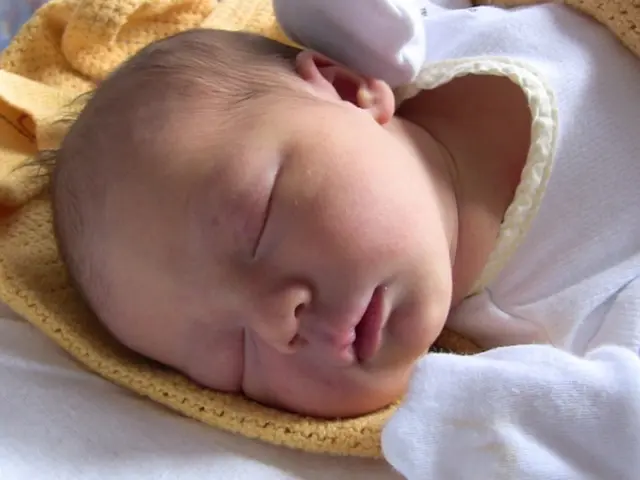Head Pain Resulting from Upright Positions
Headaches When Changing Positions: Unraveling the Mystery
Getting a headache when you stand up or move from a lying down position? It's time to pay attention, and maybe even visit your doctor.
Here's the deal. When headaches come on after changing positions, they're usually a symptom of an underlying condition. Family medicine specialist Scott Owen, DO explains the reasons behind these postural headaches and when you should seek medical advice.
What Triggers Headaches When Standing Up?
These headaches, commonly known as positional headaches, are linked to changes in your body position. It's all about pressure.
Positional headaches are essentially a subtype of secondary headaches, differing from primary headaches like tension headaches or migraines. In case you're wondering, primary headaches are independent conditions that don't stem from some other health issue.
What Does a Positional Headache Feel Like?
The main symptom here is the aching or throbbing pain that hits when you stand from a seated or lying down position. In some cases, the headache gradually intensifies as you go about your day. And the good news? It usually eases up when you lie down again.
The location of the headache can vary based on the underlying cause, but most positional headaches affect both sides of your head.
Possible Causes of Headaches When You Stand Up
Several conditions, some seemingly innocuous, could be behind those postural headaches.
Dehydration
If you experience headaches throughout the day but they vanish the following day, it might be a sign you're not drinking enough fluid. Yep, you guessed it! Dehydration can cause multiple types of headaches, including those triggered by changes in position.
Apart from headaches, dehydration can cause:
- Dizziness
- Dry mouth
- Fatigue
- Muscle cramps
- Dark-colored urine
The solution? Simple: drink more water or electrolyte beverages.
Cerebrospinal Fluid Leak
Chronic positional headaches could indicate a cerebrospinal fluid (CSF) leak through an opening in brain tissue called the dura. CSF cushions your brain and spinal cord.
If you have a CSF leak, fluid pressure inside your head drops, leading to a condition called intracranial hypotension. It's more likely to happen after medical procedures like a lumbar puncture (spinal tap) or epidural, or following brain or spinal injuries.
If you experience a positional headache within hours of a procedure or injury, seek immediate medical attention. Depending on the severity of the leak, you might require an epidural blood patch, which involves injecting some of your blood into your spinal canal to help clot the leak.
A CSF leak can also be spontaneous or idiopathic, meaning it occurred out of the blue and there's no obvious reason for it. People with certain connective tissue diseases like Marfan syndrome or Ehlers-Danlos syndrome are at a greater risk of CSF leaks.
Idiopathic intracranial hypertension (unexplained high pressure inside the skull) can also cause or indicate a spontaneous CSF leak. Medications used for altitude sickness often alleviate head pain caused by spontaneous CSF leaks.
Other Conditions
Several other health conditions can prod positional headaches. Treating the underlying condition usually eases up the headaches.
- Arthritis and neck injuries can cause cervicogenic headaches, worsening when you stand up or move your head.
- Chiari malformation, a condition where brain tissue pushes into the spinal canal at the base of your skull, can exert pressure on your spinal cord when you change position.
- Orthostatic hypotension (a sharp drop in blood pressure when standing up) commonly causes dizziness right after waking up and headaches, especially if you're on blood pressure medication.
- Postural orthostatic tachycardia syndrome (POTS) often makes you feel dizzy when you stand up and can cause positional headaches.
- Severe anemia or blood loss can affect oxygen supply to your brain, causing headaches.
- Brain tumors can cause positional headaches, but they're rarely the root cause of positional headaches. Other symptoms like nausea, vomiting, or seizures are more common with brain tumors.
When to Consult a Healthcare Provider
If you experience any type of headaches accompanied by nausea, vomiting, or other worrying symptoms like seizures, seek medical help. It's also essential to consult a healthcare professional if you develop positional headaches after a medical procedure or injury.
A positional headache might signal changes in fluid pressure in your brain that require medical attention. Your provider will perform a physical exam, review your medical history, and evaluate your symptoms to identify the cause. A brain MRI can reveal changes in CSF fluid and identify conditions like Chiari malformations that can lead to postural headaches.
Remember, most headaches aren't associated with serious conditions. The probability of a brain tumor causing a postural headache is extremely low. Still, it's crucial to share any unusual or persistent head pain with your provider.
- Postural headaches can be a sign of underlying medical conditions, such as dehydration, cerebrospinal fluid leak, arthritis, neck injuries, Chiari malformation, orthostatic hypotension, Postural Orthostatic Tachycardia Syndrome (POTS), severe anemia, or brain tumors.
- A cerebrospinal fluid leak, if chronic, could indicate a potential leak through the dura, which cushions the brain and spinal cord, causing intracranial hypotension and positional headaches.
- Incorporating health and wellness practices, like maintaining proper hydration and addressing mental health, can contribute to overall headache prevention and management, along with addressing any underlying medical conditions.







